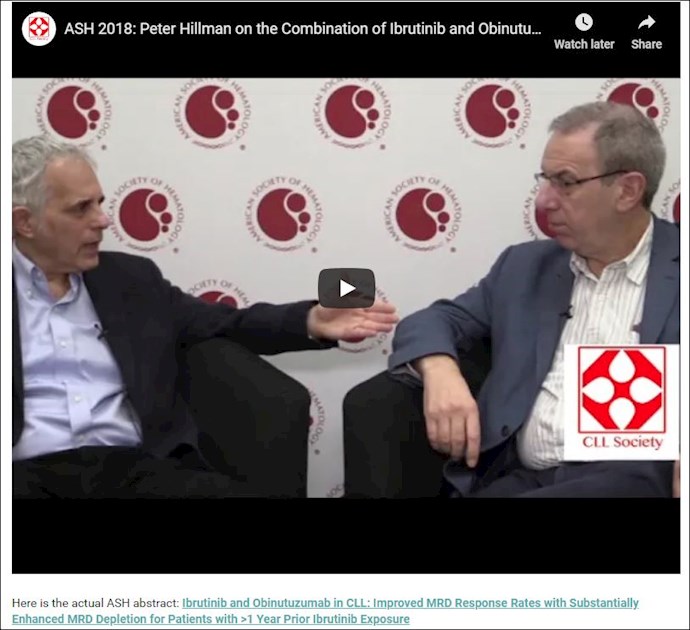Today we start with an important abstract from the United Kingdom that may have significant immediate and future treatment implications.
-
Professor Peter Hillmen .... has chaired the chronic lymphocytic leukaemia (CLL) trials sub-group of the National Cancer Research Institute (NCRI) in the UK since 2002.
He has lead the UK, and perhaps the world, in developing fast moving, clinically relevant and responsive trial design. In fact four years ago at ASH 2014, we discussed his innovations in trial design (Trials Acceleration Program or TAP) in this interview. The IcICLLe Extension study is an example of this quick, responsive clinical trial process.
-
In this case, Professor Hillmen and his team tweaked a trial of patients taking ibrutinib (Imbruvica) by adding in the anti-CD20 monoclonal antibody obinutuzumab (Gazyva) to deepen the remissions and the results were both positive and surprising.
-
Take Aways:
Adding obinutuzumab to ibrutinib deepened the depth of remission in relapsed/refractory CLL patients.
It matters when the monoclonal antibody is added for chronic lymphocytic leukemia patients.
Patients receiving obinutuzumab after >1 year prior ibrutinib on its own achieved a higher response rate compared to those who started the two drugs together. The complete response rate or complete responsewith incomplete blood count recovery rate (where some of the blood test have not returned to normal) were 50% versus 30%.
A higher proportion of patients receiving obinutuzumab after >1 year prior ibrutinib on its own achieved bone marrow U-MRD4 (where less than 1/10,000 cells is a CLL cells) namely 50% versus. 6%. In other words, ½ those patients cleared their bone marrow of detectable CLL with the sequenced combination compared to only 6% who started the two medications at the same time.
There were also no infusion reactions in those who were on ibrutinib for a year before adding obinutuzumab. This may be due to ibrutinib’s effect on the T cells dampening the immune response to a foreign antigen (protein).
-
Conclusions
It is important to remember that response rates are less critical to patients than survival data, and that adding a different older anti-CD20 antibody, rituximab to ibrutinib has yet to show a survival advantage.
-
The addition of obinutuzumab may tell a different story and it certainly seems that the sequencing matters. That is something new and exciting with potential broad therapeutic implications.
In my interview from the last day of ASH 2018, Dr. Hillmen speculates on those specific issues.
-
Here is the interview:
Here is the actual ASH abstract: Ibrutinib and Obinutuzumab in CLL: Improved MRD Response Rates with Substantially Enhanced MRD Depletion for Patients with >1 Year Prior Ibrutinib Exposure
ash.confex.com/ash/2018/web...
-
Len
